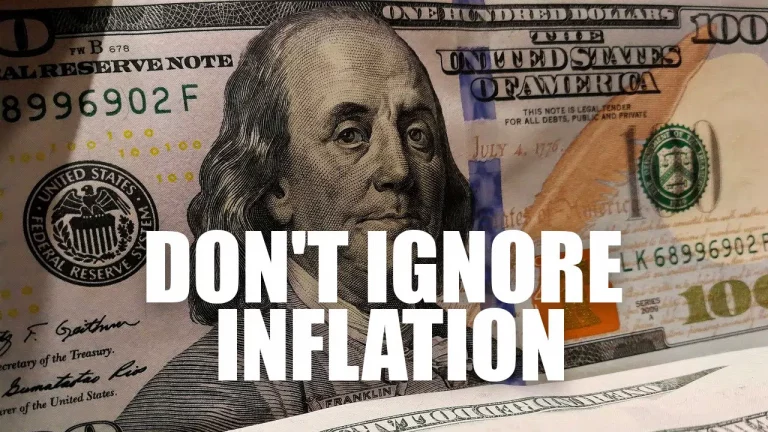Your retirement is being attacked— by inflation! That’s right. Your dreams of sitting on a beach with gray hair, a good book, and a cold beer are under siege. It’s time to strategize to protect your older years and conquer inflation once and for all.
You’ve heard your grandparents talk about going to the movies when they were kids. For just a couple of bucks, they could buy their tickets, a soda, and supersized popcorn.
“Boy, how things have changed!” is usually their next line.
But if you think back to when you were a kid, movies and snacks were cheaper too. That’s because of inflation. Inflation makes the price of goods and services increase over time. It might not seem like a big deal when you’re younger, but inflation’s impact gets bigger and bigger as years pass.
By the time you’re planning for retirement, you’re in a battle against inflation.
You must understand your enemy before you can defeat your enemy.
While that may sound like fortune cookie nonsense, it’s good advice when it comes to tackling inflation. Understanding how inflation works will give you the upper hand in making sure it doesn’t affect you.
The products you buy and the services you use cost more with inflation, but inflation isn’t just about increasing prices. Inflation is the continual rise in the average prices of goods and services. This results in a decrease in the purchasing power of your dollar— meaning you can buy fewer goods and services for the same amount of money.
It’s an indirect relationship. As prices go up over time, the value of money goes down. Inflation increases, purchasing power decreases.
Prices of goods and services rise at different rates, and we use these changing prices to calculate an average inflation rate. The cost of goods is compared annually, so inflation rates can be compared year-to-year.
According to Trading Economics, the inflation rate over the last century averages about 3.25%. Some experts think it’s as high as 13%. I personally think it’s above 10%
So what’s causing inflation?
There is more than one theory about what causes inflation. One is the demand-pull theory. Increasing demand for goods and services drives prices up to prevent inventories from being depleted.
Another theory is cost-push. If production costs increase, companies have to push up prices to keep making a profit.
But the biggest villain of them all is Monetary inflation. If there is an oversupply of money, the value of that money goes down, and prices go up. As you know, we are in the middle of a money printing party.
The Fed is printing money to their heart’s content.
Unfortunately, for as long as we are using the monetary system we are using now, inflation will stay.
So, how does inflation affect us?
We lose the value of our dollar.
Get this.
As a national average, buying a house now will cost you $200K. That’s a national average. It’s more expensive in California.
But back in 1940, the median home value was $2,938.
In 1980, it was $47,200.
That’s what inflation does. It makes things more expensive. Even if you start earning more, you also spend more.
How do you fight inflation?
First, we are not financial advisors. What we are about to share is meant to be used as part of your bigger research and planning process.
Now that that’s out of the way, we can go to the meat of this video.
Money can’t be worth more than it is today because of the time value of money. But the money you have today can be put to work for your future. The more money you have, the greater potential you have to generate more money. The sooner that money is wisely invested, the longer it has to accumulate compound interest.
Because of inflation, you have more purchasing power today than you will tomorrow. This is why you should invest now.
Here is a caveat though.
All investments have risks. Some are riskier than others but all of them have risks.
So, first, ask yourself. What is your goal and what type of an investor are you.
Do you want to retire in 10 years or do you want to keep on working and secure your retirement?
Do you want to build toward $100M or $10M will do?
Are you a risk-taker or would you rather go slow and steady?
Next is to know the different types of investments – stocks, ETFs, bonds, and real estate are some of the investments you can make.
In each of these assets, you can further diversify. For stocks, you have dividend-paying stocks, penny stocks, and others.
For real estate, you can buy properties or get into a Real Estate Investment Trust.
Again, go to your financial advisor to get a more detailed explanation of all these.
What we always suggest is diversification. I personally have businesses. I have investments in some real estate. I also invest in the market. I have cryptos.
I also have gold because as much as I like taking risks to beat inflation, I know I need an asset that will serve as my last line of defense. Everything could crash and we have been through that several times.
Gold is the only one that remains up. It is the best hedge. The store of value and the one asset inflation never managed to take down.
So, keep investing. Diversify. And keep your investments safe.
If you want to know more about investing in gold, Noble Gold investments will help you. In fact, we will help you even if you simply have questions you want to be answered. Call us for a no-pressure discussion about gold.







